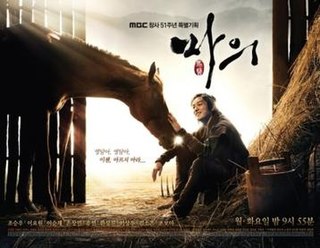Seoul Institute of the Arts (Korean: 서울예술대학교) is an arts university in Ansan, Gyeonggi Province, South Korea. The Namsan campus in Seoul is used for presentation of arts productions and convergence with industry. The Ansan Campus opened in 2001 and is used for educational training.

Taejo Wang Geon is a 2000 Korean historical period drama. Directed by Kim Jong-sun and starring Choi Soo-jong in the title role of King Taejo. The drama aired from April 1, 2000, to February 24, 2002, in 200 episodes. The scene dealing with the end of Gungye gained a lot of popularity, recording the highest viewership rating of 60.4% in the metropolitan area.

The South Korea men's national volleyball team represents South Korea in international volleyball competitions and friendly matches, governed by Korea Volleyball Association. The Republic of Korea (ROK) has competed in the Olympic Games eight times, but has not featured since the 2000 Olympic Games in Sydney, Australia. The national team's best performance at the Olympic Games was 5th place at the 1984 Games in Los Angeles, California, United States. The national team at the FIVB World Championship competed nine times, with their best result at 4th place in 1978. On continental level, The national team won three gold medals at the Asian Games in 1978, 2002 and 2006. And at the Asian Championship, the national team won four gold medals, two of these was at home in 1989 Seoul and 2001 Changwon and the other two are in 1993 and 2003. The national team now ranks 28th in the FIVB World Rankings.

Nonstop (Korean: 논스톱) is a South Korean sitcom that broadcast its first season in 2000 on MBC. It continued with 5 more seasons. The series was popular for its cast of teen idols, many who debuted through the show gaining vast popularity.

South Korea participated in the 2006 Asian Games in Doha, Qatar on 1–15 December 2006. South Korea ranked 2nd with 58 gold medals in this edition of the Asiad.

South Korea competed at the 2009 East Asian Games held in Hong Kong from October 29, 2005, to November 6, 2005.

Gyebaek is a 2011 South Korean period drama series, starring Lee Seo-jin, Cho Jae-hyun, Song Ji-hyo and Oh Yeon-soo. It aired on MBC from July 25 to November 22, 2011 on Mondays and Tuesdays at 21:55 for 36 episodes.

The King's Doctor is a 2012 South Korean television series depicting Baek Gwang-hyeon (1625–1697), Joseon Dynasty veterinarian, starring Cho Seung-woo and Lee Yo-won. It aired on MBC from October 1, 2012 to March 25, 2013 on Mondays and Tuesdays at 21:55 for 50 episodes. The historical/period epic drama commemorated MBC's 51st anniversary.

Dream of the Emperor is a South Korean television series that aired on KBS1 from September 8, 2012 to June 9, 2013 on Saturdays and Sundays at 21:40 for 70 episodes.

Quiz of God is a South Korean television series broadcast on cable channel OCN. It was the first medical/forensic crime investigation drama to air in Korea. The series follows genius but eccentric neurosurgeon and forensic doctor Han Jin-woo and his team as they solve suspicious deaths and unravel mysteries involving rare diseases.

Flowers of the Prison is a 2016 South Korean drama television series starring Jin Se-yeon, Go Soo, Kim Mi-sook, Jung Joon-ho, Park Joo-mi, Yoon Joo-hee, Kim Soo-yeon, Jun Kwang-ryul and Choi Tae-joon. It is MBC's special project drama to commemorate the network's 55th-founding anniversary. The drama also marks the 3rd time collaboration between director Lee Byung-hoon and writer Choi Wan-kyu, after Hur Jun and Sangdo. It replaced Marriage Contract and aired on MBC every Saturday and Sunday at 22:00 (KST) for 51 episodes from April 30 to November 6, 2016.

OB & GY, also known as Obstetrics and Gynecology Doctors, is a 2010 South Korean medical drama television series. It aired on Seoul Broadcasting System on Wednesdays to Thursdays at 21:55 for 16 episodes beginning February 3, 2010. The drama depicts the difficult decisions and moving human stories that take place daily in the OB-GYN department, focusing in particular on Seo Hye Young, a talented and determined obstetrician who has just transferred from the prestigious Seoul base to the branch hospital. Her straightforward manner of handling her professional life is in contrast with her love life, which is marred by her relationship with a married man. This becomes even more entangled when she meets Lee Sang Shik, the chief of NICU, and her long-time friend Wang Jae Suk also shows his interest.

Manhole is a South Korean television series starring Kim Jae-joong, Uee, Cha Sun-woo, Jung Hye-sung. It aired on KBS2, from August 9 to September 28, 2017 on Wednesdays and Thursdays at 22:00 (KST) for 16 episodes.

My Unfamiliar Family is a 2020 South Korean television series starring Jung Jin-young, Won Mi-kyung, Choo Ja-hyun, Han Ye-ri, Shin Jae-ha and Kim Ji-seok. It aired on tvN from June 1 to July 21, 2020.
Daemyeong is a 1981 South Korean television series starring Kim Dong-hoon, Kim Heung-ki, Seo Young-jin, Won Mi-kyung, Kim Sung-won and Baek Il-sub. It aired on KBS1 from January 5, 1981 until December 28, 1981 every Mondays for 52 episodes.











